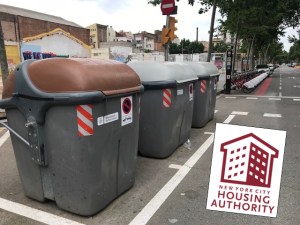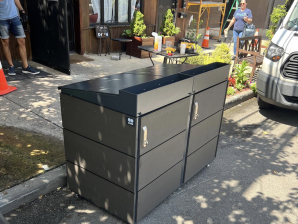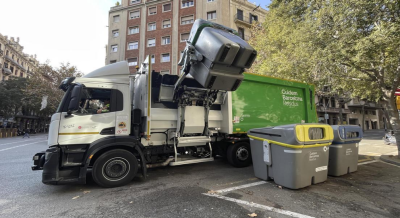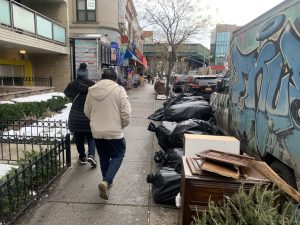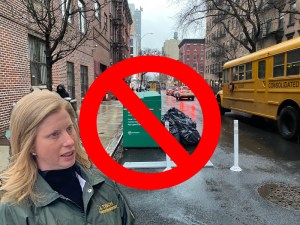NYC to Contractors: We Want To Get Serious About Trash Containerization
Forget about the small-ball (and bin!) pilots. This is the Big Kahuna — a 'scalable' pilot that will modify 'sanitation fleets and staffing practices.'
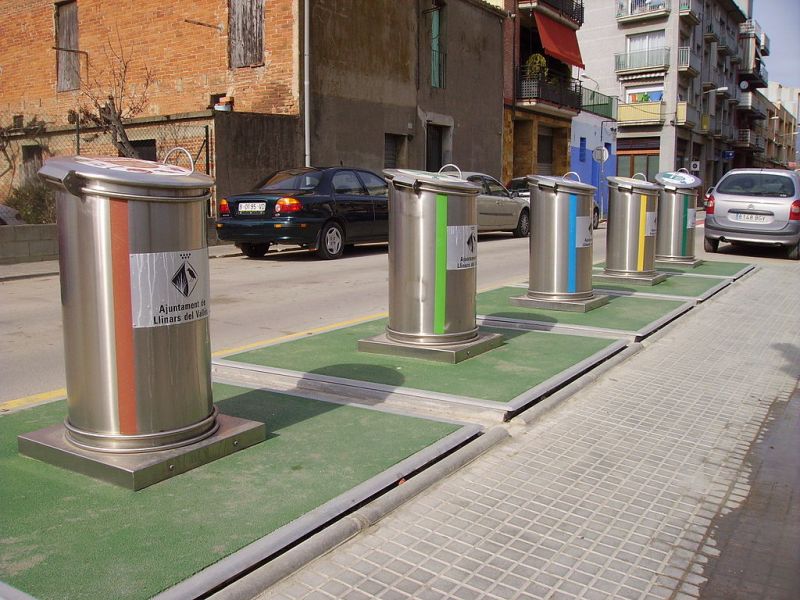
Enough with the small bins!
The Department of Sanitation is looking to launch a containerization pilot on “a massive scale…never before done by the City,” according to a request for proposal put out by the NYC Economic Development Corporation to a select group of consultants.
The RFP, which was obtained by Streetsblog, anticipates an entirely different animal than the tiny containerization efforts that we’ve seen so far in DSNY’s Clean Curbs program. Clean Curbs put bamboo-clad CITIBINs — the kind you might have in front of your brownstone — at several business improvement districts and will soon come to residences on West 45th Street. This new pilot will “at a minimum, secure a vendor (or vendors) to manufacture waste containers throughout the City, install waste containers, and provide support with the maintenance of waste containers for a defined period of time,” including “modifications to sanitation fleets and staffing practices to support waste containerizations.”
That could mean that the city will be outfitting its trucks with mechanisms that can hoist large containers — a holy grail for advocates who look askance at the city’s current, antiquated methods of trash collection. Right now, DSNY trucks are what are colloquially called a “full-employment program,” with two of “The Strongest” on each truck hoisting smaller containers by hand.
DSNY spokesman Vincent Gragnani declined to say, however, if the pilot would change the way the department picks up trash or much else about it — because it’s still in the “study” stage. “We are funded for and extremely excited about a citywide containerization study” and that the department is “looking forward to working with a team of consultants to study this issue in a comprehensive, holistic way, to develop the effective solutions New Yorkers expect and deserve.”
Gragnani said the department expects the study to be completed by the end of the fiscal year, July 1, 2023.
The aim of the pilot is to finally give a good shave to New York’s infamous “5 o’clock shadow,” the mountains of leaky, stinking trash bags that appear on sidewalks each collection day — a problem that municipalities around the world solved long ago through various containerization strategies but that has plagued our city, seemingly intractably, since the 1960s. DSNY is already exploring curtailing the hours that the bags may be put out, but it’s been teasing the fact that it’s seeking a more comprehensive solution for a while. Mayor Adams put $5 million in the budget for the study of containerization. (By comparison the small Clean Curbs pilot is costing taxpayers $1.3 million.)
During a City Council hearing on May 10, Sanitation Commissioner Jessica Tisch said that she had been seeking pointers about waste containerization from officials in Barcelona, a city famous for its innovative underground containerization facilities.
Whoever wins the contract will identify 3-4 other major cities who have curbside containerized waste, and decide on “three prioritized options,” according to the RFP. The consultants chosen for the 24-week contract will recommend containers for a variety of settings, looking at “the typical amount of trash disposed per dwelling unit/type of customer served by DSNY; the types of waste typically disposed of (e.g., recycling, refuse); and how to sub-divide the City based on geography, density, land use.”
The contract must also weigh “quality of life impacts (e.g., street aesthetics, pedestrian impacts, impacts on rat populations), construction considerations (e.g., speed of deployment, ability to deploy equitably across neighborhoods to the City) [and] operational considerations (e.g., ability to integrate into DSNY collection operations, long-term maintenance programs costs to the City, durability).”
The document does not quote any dollar figures either for the pilot itself or for the contract, asking the consultants for a work-up of costs. It anticipates the start of the consultant contract on Sept. 26, but says that could change, and acknowledges that the Clean Curbs pilots (the BID part of which has been experiencing some hiccups) are an appetizer, calling them “a small, but meaningful, step” toward containerization that “leave open the question as to whether and how to achieve a uniform, scalable program that’s adaptable to the needs of all of New York City’s diverse communities.”
Can the city do it? DSNY recently relaunched its composting pilot in one borough, Queens, after failing in efforts that dated back to 2013. As Politico recently detailed in an epic series on our sanitation practices, the city has been “going backward” in its goal to zero out residential waste by 2030.
